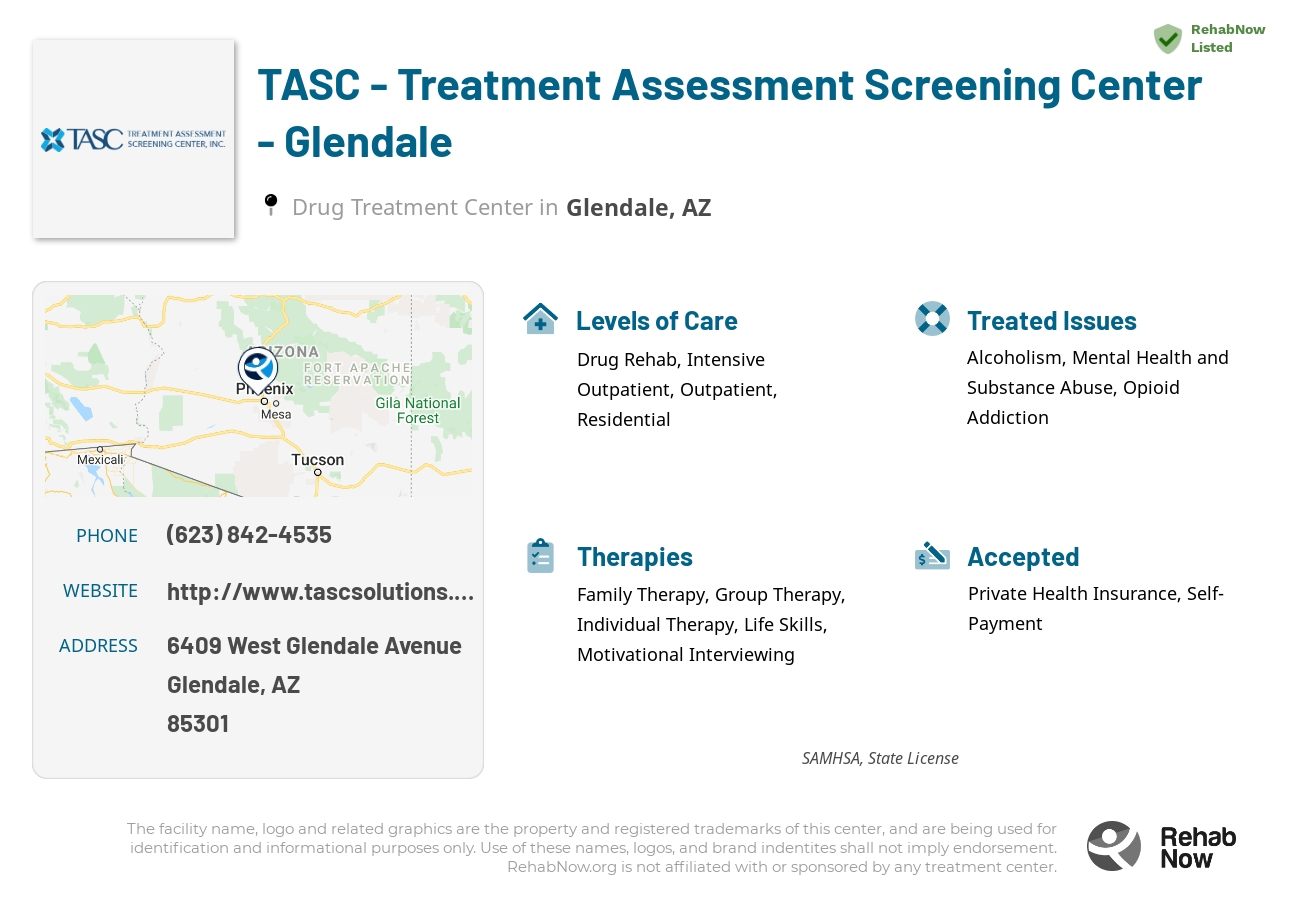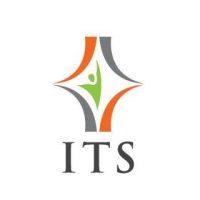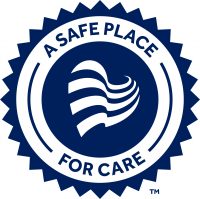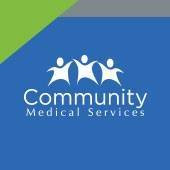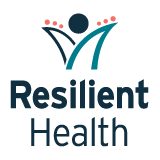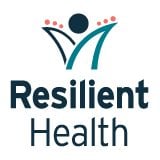TASC - Treatment Assessment Screening Center - Glendale
Drug Rehab Center in Glendale, Arizona
TASC - Treatment Assessment Screening Center - Glendale is an outpatient facility in Arizona providing comprehensive treatment, assessment, and screening for substance use and mental health disorders, with individualized services including family therapy, medication-assisted treatment, and referrals to detox and residential treatment centers.
Multiple patients have reported TASC - Treatment Assessment Screening Center - Glendale as permanently closed.
Research other rehabs in Glendale, Arizona, or get help finding an open facility.
About TASC - Treatment Assessment Screening Center - Glendale in Arizona
Treatment Assessment Screening Center (TASC) in Glendale, Arizona, focuses on mental health and substance abuse services through evidence-based programs. This non-profit outpatient facility supports individuals with a mission to foster a drug-free community by providing comprehensive behavioral health services, DUI education and treatment, and domestic violence offender programs. Founded with a vision for community improvement, TASC utilizes innovative therapy models and is committed to high standards of care and service.
- Utilizes a wide range of evidence-based modalities including Cognitive Behavioral Therapy (CBT), Motivational Enhancement Training (MET), and Moral Reconation Therapy (MRT).
- Offers specialized DUI treatment programs in a confidential setting to fulfill court or motor vehicle mandated conditions.
- Conducts Relapse Prevention Therapy (RPT) groups using the Gorski-Cenaps model, guiding clients through recovery after initial treatment phases.
- Accepts various forms of payment excluding cash and credit cards, with substance abuse counseling sessions at $25 for a 2-hour class.
Accredited by the Commission on the Accreditation of Rehabilitation Facilities (CARF) and carrying a state license, TASC's reputation is underscored by their memberships and acknowledgments within the healthcare community, including the National Council on Alcoholism and Drug Dependence (NCADD). Their commitment to excellence in care and quality is evidenced by numerous awards from the Arizona Department of Health Services.
TASC addresses a range of issues from substance use to mental health disorders. Treatment options span from individual and group therapy to medication-assisted treatment and more intensive interventions. With services rooted in the latest clinical research and tailored to individual needs, TASC exemplifies dedication to effective recovery and long-term sobriety.
Genders
Ages
Modality
Additional
Accreditations
State License
SAMHSA
Conditions and Issues Treated
Opioid addiction is when someone becomes addicted to opioids. This can happen quickly due to any opioid use. Opioid withdrawal can be uncomfortable and lead the user to continue using even if they want to quit. It’s best to receive inpatient treatment for detoxification.
Even if a person doesn’t need inpatient treatment, it’s recommended to start rehabilitation or at least some kind of outpatient treatment. This is because the withdrawal symptoms from opioids can be uncomfortable and unpleasant, to the point that a person could end up using again or worse.
Detoxification should be done to break the physical addiction of opioids. This can be done with opioid replacement therapy, medication-assisted therapy, or a more traditional detoxification program. Intensive outpatient treatment is a form of addiction care that allows patients to continue living at home while undergoing treatment. This type of care is appropriate for patients who have been treated in residential treatment programs. Intensive outpatient programs include regular visits to the facility providing therapy, and patients gradually return to their routine life. IOP benefits most when patients have a supportive family member or friend to help them recover.
The first step to getting into an intensive outpatient program is to attend a detoxification facility. Detoxification facilities are designed to remove substances from the body safely. The patient will attend sessions designed to help them understand their addiction and its impact on their lives. While in an intensive outpatient program, therapy sessions are scheduled three to five times per week, with the patient attending no more than two sessions in one day.
Levels of Care Offered
This center offers a variety of custom treatment tailored to individual recovery. Currently available are Drug Rehab, Intensive Outpatient, Outpatient, Residential, with additional therapies available as listed below.
An intensive outpatient treatment program, or IOP, is set up for those struggling with an addiction to begin the recovery process. However, the patient will not live at the facility during treatment.
IOP involves patients coming in and out of a medical office building regularly to receive therapy and other services while continuing their life outside of these visits.
IOP is a step up from drug detoxification or alcohol detox. However, it’s still considered a phase of recovery rather than the ultimate goal. There are many rehabs and treatment facilities available to patients in need of IOP.
Outpatient treatment consists of counseling and therapy sessions. The outpatient treatment process begins with the addict’s initial detox period, lasting about ten days. Outpatient treatment is used for those who are at moderate risk for “slipping back” into the addiction. It is also used for those who are not currently experiencing any side effects from withdrawal, can handle social pressure, have a stable living environment, and have a good support system.
Residential treatment programs are those that offer housing and meals in addition to substance abuse treatment. Rehab facilities that offer residential treatment allow patients to focus solely on recovery, in an environment totally separate from their lives. Some rehab centers specialize in short-term residential treatment (a few days to a week or two), while others solely provide treatment on a long-term basis (several weeks to months). Some offer both, and tailor treatment to the patient’s individual requirements.
Therapies & Programs
Individual Therapy is a crucial component of addiction recovery. Therapists work with patients to identify the root of their addiction and figure out how to better handle the issues that led to them using drugs. Individual Therapy is one on one sessions where people meet with their therapist. Individual therapy provides a safe space for people to open up and discuss personal and sensitive topics which they may not feel comfortable discussing in a group setting.
In this type of therapy, therapists can develop specific solutions for each patient, which helps speed up their recovery process. In addiction recovery, therapy is a crucial part. It allows patients to go deep into their core issues and discover how those problems can be better handled now. Therapy can be performed in individual sessions as well as group settings. In individual therapy for addiction, the patient meets with the therapist one-on-one to focus on the underlying issues of addiction and come up with solutions to prevent future abuse.
Family therapy is a crucial part of drug treatment and getting sober. It is one of the most effective ways to help addicts stay on the path to long-term sobriety. One of the most important parts of family therapy is the relapse prevention plan. During treatment, therapists and doctors will often sit down with the addict and their family to develop a plan if the addict ever feels like they want to use again. This plan should involve steps the addict and family can take together to prevent them from relapsing in the future.
An addict’s family can play a vital part in helping them to avoid relapse because they can spot the warning signs and help them get back on track before it becomes too much of a problem. Family therapy is one of the most effective ways to help addicts stay on the path to long-term sobriety.
Group Therapy is employed by drug treatment centers like TASC - Treatment Assessment Screening Center - Glendale to provide the recovering addict with a platform to talk about their feelings and experiences. It also provides for an opportunity to learn from other addicts who have successfully overcome their addiction. It is recommended that all group members be recovering addicts for this type of therapy to work.
Cognitive Behavioral Therapy (CBT) is an approach and method in psychotherapy. TASC - Treatment Assessment Screening Center - Glendale asks people to investigate how their thoughts, including habitual, harmful, and inaccurate ways of thinking, affect behaviors. CBT is based on the idea that rigid, inflexible ways of thinking cause people to have a limited ability to cope with stress, which leads to emotional distress.
Likewise, CBT helps people identify maladaptive behaviors and replace them with more positive behaviors. It makes you look at the way you perceive something and ask: Is this a realistic belief? CBT asks people to look at the role of behaviors and emotional responses and how they may be distressing in one’s life. The goal of CBT is to change the way people think and behave to achieve a more balanced, healthier lifestyle.
Moreover, CBT has been shown to reduce some types of anxiety disorders, depression, and symptoms related to thoughts or actions that are considered harmful.
Life Skills Services provide services aimed at helping people enter into and maintain long-term sobriety. The services are offered at varying levels of intensity, specific to the needs and requirements of each patient. Some benefits of these services are restoring hope and empowerment, enhancing family involvement, increasing patient compliance, and reducing relapse rates.
Training someone on improved life skills allows someone recovering from an addiction to feel more capable of taking care of him or herself. The skills taught in TASC - Treatment Assessment Screening Center - Glendale are daily skills that give a better recovery foundation by simply giving the person tools they need to survive.
Payment Options Accepted
For specific insurance or payment methods please contact us.
Is your insurance accepted?
Ask an expert, call (888) 674-0062
Treatment Assessment Screening Center Associated Centers
Discover treatment facilities under the same provider.
- TASC - Treatment Assessment Screening Center - Kingman in Kingman, AZ
- TASC - Treatment Assessment Screening Center - Bullhead City in Bullhead City, AZ
- TASC - Treatment Assessment Screening Center - Greenway Road in Phoenix, AZ
- TASC - Treatment Assessment Screening Center - Canyon Hwy. in Phoenix, AZ
- TASC - Treatment Assessment Screening Center - West Drachman in Tucson, AZ
Learn More About Treatment Assessment Screening Center Centers
Additional Details
Specifics, location, and helpful extra information.
Glendale, Arizona 85301 Phone Number(623) 842-4535 Meta DetailsUpdated April 15, 2024
Staff Verified
TASC - Treatment Assessment Screening Center - Glendale Patient Reviews
There are no reviews yet. Be the first one to write one.
Glendale, Arizona Addiction Information
Arizona has some of the highest rates of prescription drug abuse in the United States. Methamphetamines, heroin and morphine are among the most commonly abused substances. Prescription pain relievers were prescribed to 348 million people in 2012, enough to medicate every adult in Arizona for 2 full weeks. The number of people with substance use disorders in Arizona has remained relatively constant over the past few years.
Glendale, Arizona has had a big impact on the community concerning drug addiction and abuse. According to statistics, nearly 10% of Glendale residents reported past-month use of an illicit drug. Prescription and synthetic opioids were involved in 5,669 drug overdose deaths in 2016. There are many different types of drug treatment facilities in Glendale, Arizona. Some of the most common types of treatment include detoxification, inpatient rehabilitation, and outpatient rehabilitation.
Treatment in Nearby Cities
- Fort Defiance, AZ (234.2 mi.)
- Anthem, AZ (22.9 mi.)
- Arizona City, AZ (62.1 mi.)
- Las Vegas, AZ (249.3 mi.)
- Scottsdale, AZ (16.0 mi.)
Centers near TASC - Treatment Assessment Screening Center - Glendale
The facility name, logo and brand are the property and registered trademarks of TASC - Treatment Assessment Screening Center - Glendale, and are being used for identification and informational purposes only. Use of these names, logos and brands shall not imply endorsement. RehabNow.org is not affiliated with or sponsored by TASC - Treatment Assessment Screening Center - Glendale.




